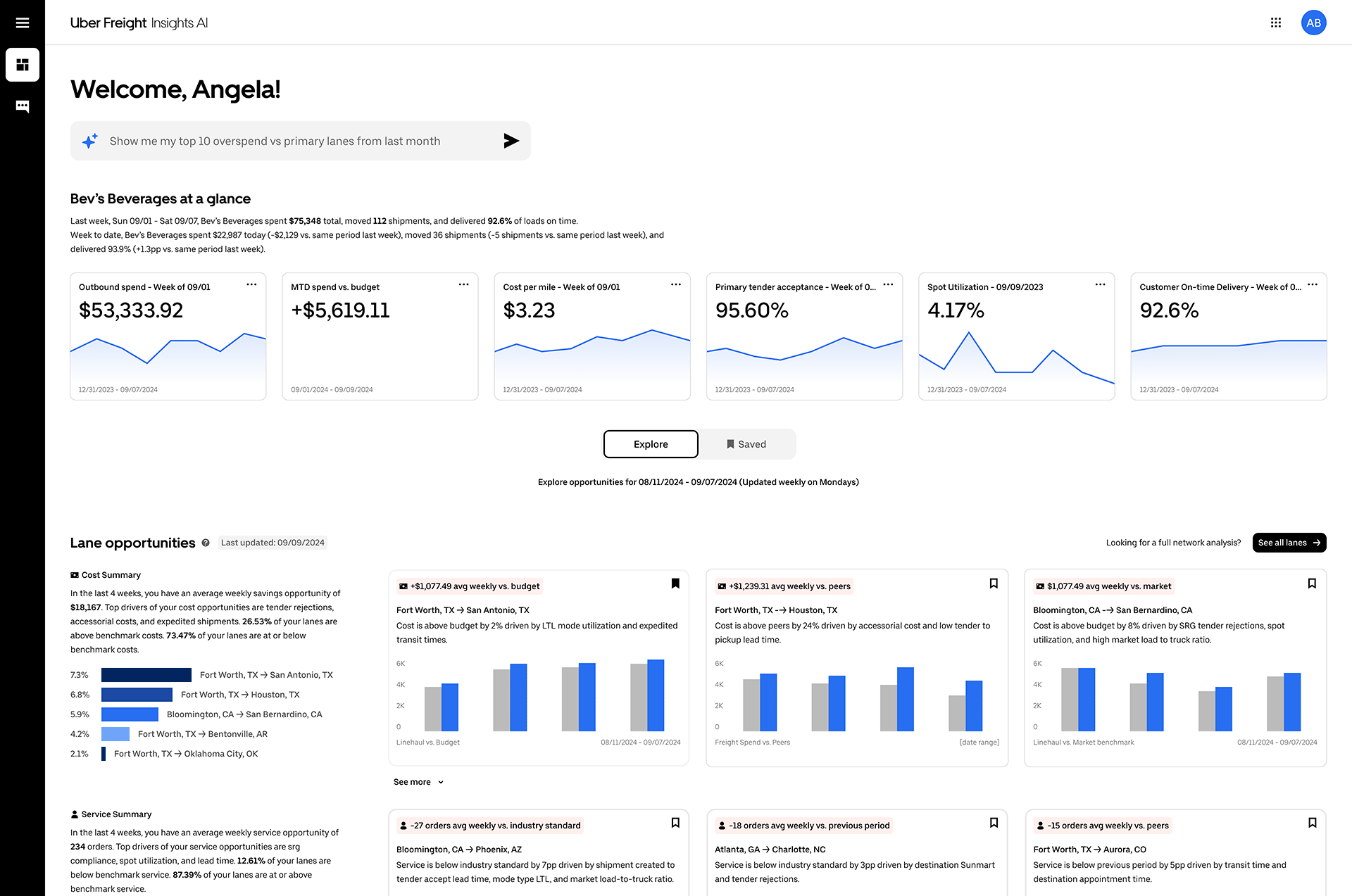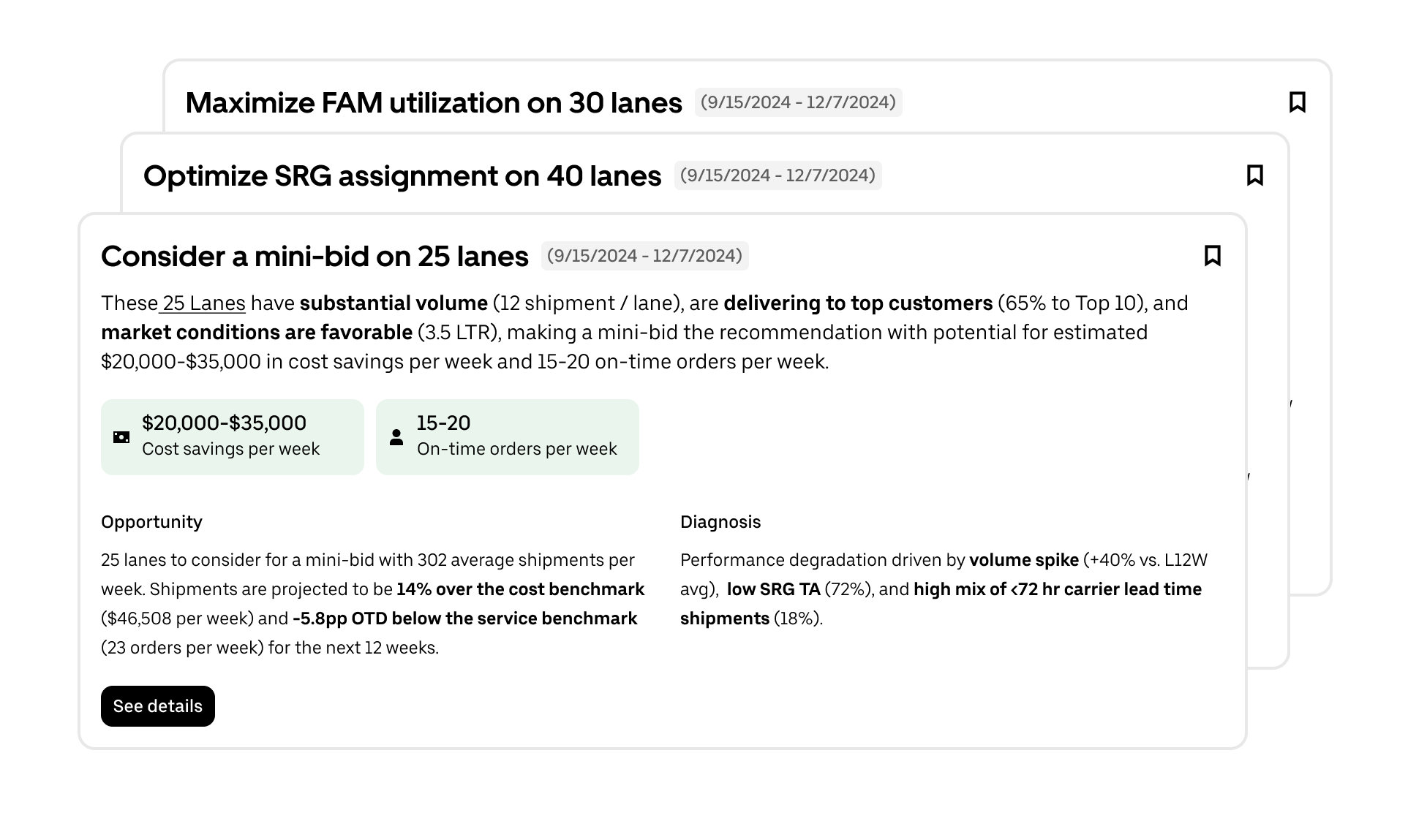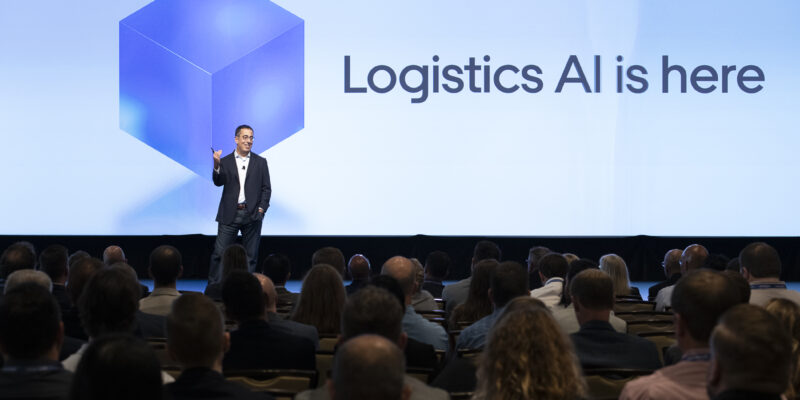Enter the era of logistics AI with Uber Freight

In the last 18 months alone, we’ve witnessed the rapid democratization of artificial intelligence (AI), marking a new era of significant digital and operational transformation within and beyond logistics.
From data readiness and adoption to integrating AI into critical day-to-day operations, leading supply chain and logistics companies are embarking on their AI transformation journey. 50% of supply chain leaders have already signaled intent to invest in its applications. These AI-powered tools have proven to be essential for leading organizations to harness their supply chain data, unlock value across their logistics operations, and ultimately fuel productivity in their most valuable resource: their people.
Now is the time to embrace AI for your supply chain. At Uber Freight, we’re already starting to see transportation teams improve decision speed and automation plus sort, read, and use data more effectively with our inaugural generative AI application, Insights AI.
But while the future holds immense promise—including logistics use cases that are still to be uncovered—there’s still significant work to be done to unlock this technology’s full potential. That’s why our world-class teams are creating a robust logistics AI ecosystem by focusing on your needs, leveraging unified and reliable data, and ensuring this ecosystem is accompanied by data protocols and safeguards.
We lead the logistics industry in AI solutions by focusing on precision and accuracy. We achieve this by segmenting the problem space and employing specialized AI agents for each task, which allows us to handle complex needs with high precision. Our approach has earned us strong performance in the text-to-SQL BIRD benchmark, where we were the only ranked logistics industry solution and performed competitively against major players like Google, IBM, and Stanford.
Our approach also ensures the data used to build and train the large language models for our AI applications is robust, so once it’s in your hands, you can confidently tackle your supply chain’s most complex challenges. Each supply chain is unique and its complexity varies from one industry to another. For AI to be truly effective, the systems which it builds upon must be digitized, connected, and capable of evolving.
Laying the foundational groundwork for AI
When we announced we were building Insights AI at Deliver 2023, we unveiled our vision for a generative AI-powered insights tool designed to revolutionize how shippers manage their networks. But developing Insights AI didn’t just begin in 2023—it took years of investment in creating a robust data foundation and technology infrastructure.
Our tracking system, designed to provide the highest quality service to shippers, is a prime example. By combining in-house tracking data and machine learning expertise, we developed a system that continuously refines facility location data and generates real-time predictions of late arrivals for operations teams. This long-term focus on data and technology has laid the groundwork for the advanced AI applications we’re building today.
Fueling models, powering applications with data
Data is the lifeblood of effective AI training, driving accuracy and innovation. Over the past 20+ years, we’ve collected, cleaned, and processed logistics metadata supporting 1 in 3 Fortune 500 companies. This historical data encompasses our robust carrier marketplace, Transportation Management System (TMS) inclusive of intermodal operations, and cross-border transactions into Mexico.
While most industry solutions using off-the-shelf AI models are still defining their data architecture, Uber Freight’s long-term investment in AI has enabled us to build a real-time data pipeline. This ensures that you receive the most up-to-date results exactly when you need them. Our extensive data access, combined with deep internal expertise, empowers us to build, train, and continuously enhance our AI offerings.
Putting principles to practice with Design Partners
To ensure our AI is purpose-built for the logistics industry, we engaged five of the world’s largest shippers from Uber Freight’s Design Partner Program to help envision, prototype, and iterate on Insights AI. By incorporating a breadth of diverse use cases across their vast and complex supply chains, we aimed to address the most challenging scenarios so we could create a reliable and applicable tool for every member of the logistics industry.
To date, these design partners’ transportation teams have asked Insights AI more than 2,000 questions. Some questions teams have asked include:
- What is my monthly spend vs. market?
- What is my monthly spot vs. contract utilization?
- Which customers had the biggest order increase MTD vs last month?
- What is my average savings from consolidation?
- What is my Live vs. Drop vs. Preload mix?
Real questions, real answers, all relevant to the world of logistics and each design partner’s unique supply chain. This is and continues to be part of our vision for building Insights AI carefully, intentionally, and cognizant of the stakes involved in logistics versus more novel, consumer-facing AI applications.
Innovations and future directions
Over the past year, we’ve gained valuable insights into what transportation teams need from an AI co-pilot. Today at Uber Freight’s annual Deliver conference, we’re introducing three enhancements to Insights AI. These include chat functionality for handling more complex queries, a new KPI dashboard that delivers real-time actionable insights, and a preview of proactive recommendations drawing from decades of data.
Enhanced chat functionality supports more complex question
Shippers face challenges in gaining comprehensive insights into their operational performance relative to industry standards, frequently relying on data from multiple sources. This fragmented approach slows discovery, limits analytical capabilities, and undermines confidence in decision-making.
We enhanced our chat tool to allow users to ask far more complex, industry-specific questions and receive precise, real-time answers tailored to their supply chain needs. For example, if you want to compare your mode mix and average length of haul against industry peers, you no longer need to gather and analyze data from multiple sources. With Insights AI, simply ask the tool and receive the analysis instantly.
AI-generated dashboard surfaces insights across core KPIs
While chat functionality enables real-time, one-on-one interactions, shippers lack an efficient way to quickly share important insights or discoveries with their entire transportation team, leading to communication gaps and delayed actions. Additionally, without a system to rank insights by attention-worthiness, users risk wasting time on less impactful issues, missing opportunities to focus on the items with the highest ROI.
Our new AI-generated dashboard democratizes insights across your core KPIs in a user-friendly, regularly updated format. It transforms individual interactions into valuable, accessible resources for the entire team. Offering curated, auto-generated insights across various dimensions and data, the dashboard ranks these insights guiding users to the most impactful items with the highest ROI.

On the horizon: Capitalize on opportunities with proactive recommendations
Proactive recommendations are coming to Insights AI in 2025 to surface suggested actions based on best practices developed over 20+ years of managing transportation for some of the world’s largest shippers.
Historically, analyzing a lane required shippers to rely on data that was 3-6 months old, limiting their ability to respond quickly to changes. With Uber Freight’s proactive recommendations, shippers can now receive real-time insights and actionable suggestions on key opportunities, leveraging best practices and collective data. This capability is the unique advantage Uber Freight brings to Insights AI, enabling faster, more informed decision-making.

Entering the logistics AI era
In an industry built on fragmentation, complexity, and volatility, generative AI has the potential to unlock new levels of efficiency and decision-making. We believe that every transportation team member’s expertise can be augmented with AI to transform the way you work.
But building revolutionary technology requires foresight and focus so teams can lay the groundwork and build cross-functionally and incrementally toward enabling these tools to make tangible, meaningful impact. It also requires close collaboration—not just among Uber Freight teams, but also in partnership with shippers like you—to get right and deliver both immediate and lasting value.
Our goal to empower you and your team with an intelligent logistics co-pilot that helps analyze your network, contextualize market trends, uncover hidden opportunities, and enable better decisions for your supply chain can’t be done in a vacuum. This is just the beginning of the era of logistics AI, and we want to embark on your AI transformation journey with you.


